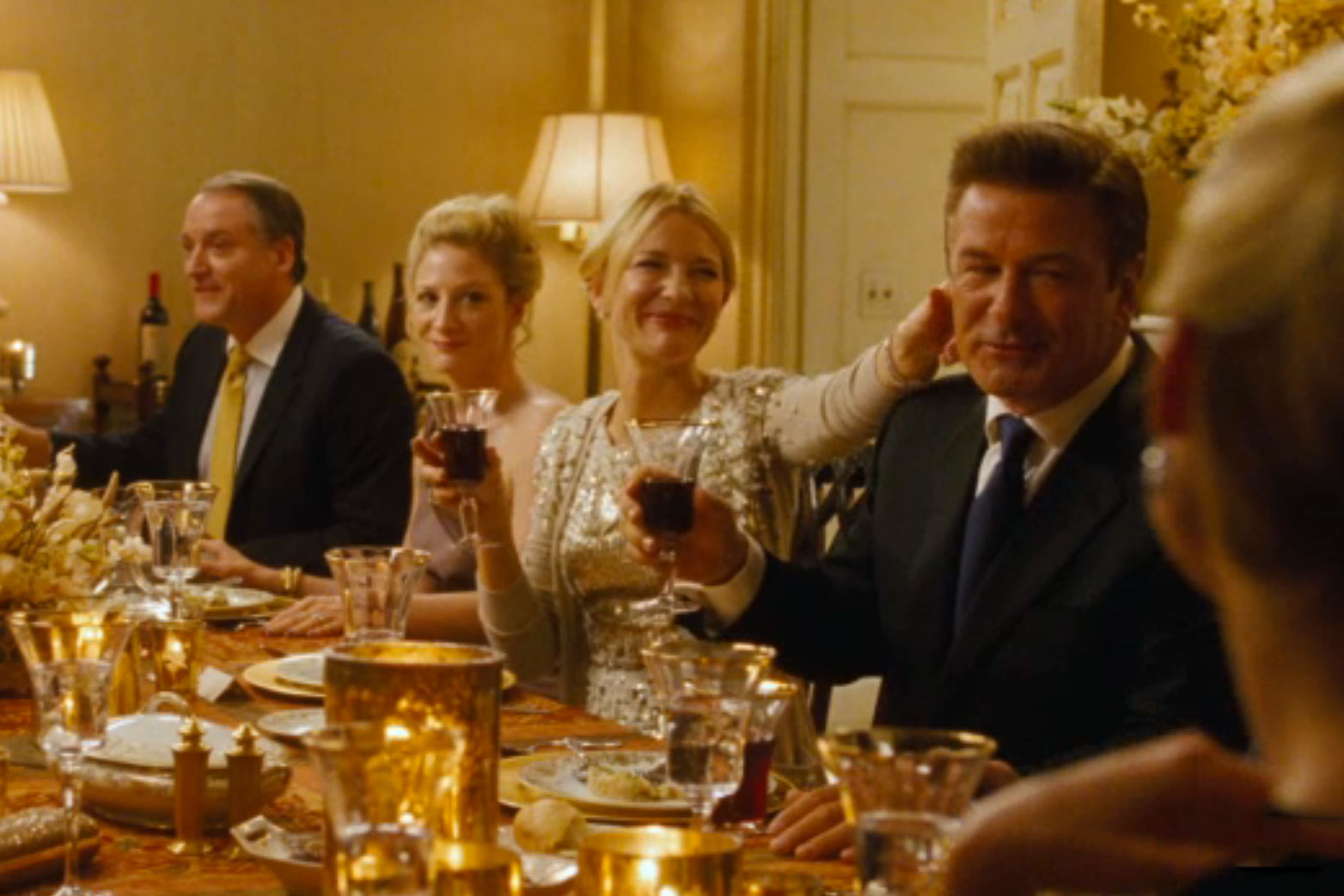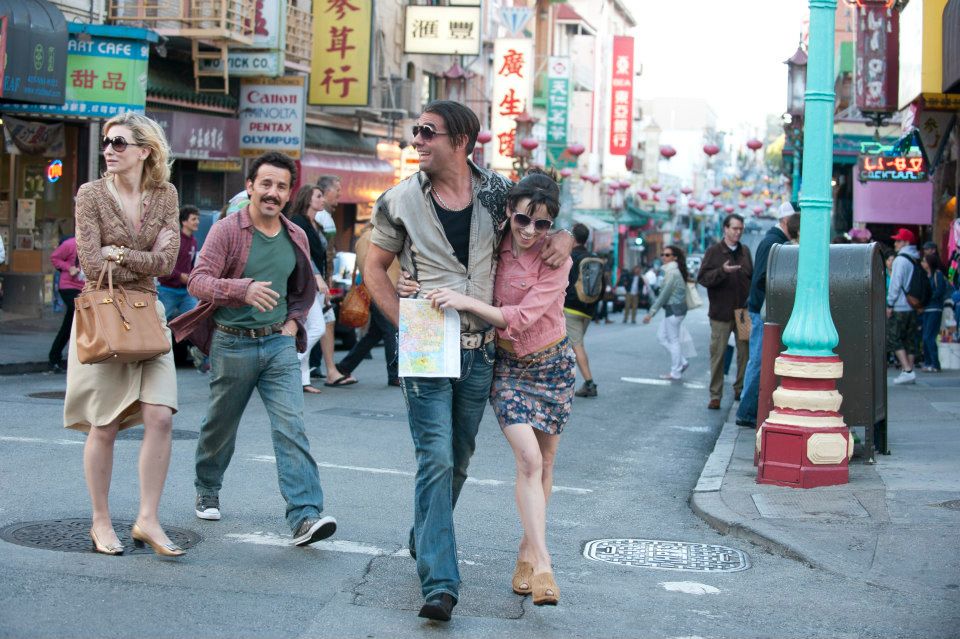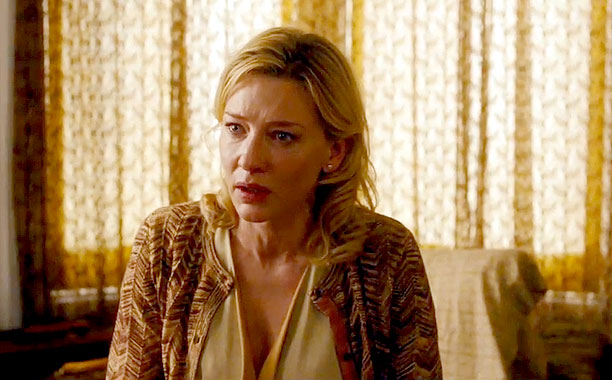|
Blue
Jasmine opens
with Jasmine (Cate Blanchett) talking to an elderly woman while flying
first
class. She continues to talk to the woman off the plane, describing her
romance
shared with her ex-husband Hal (Alec Baldwin). The other woman doesn't
know why
she persists with talking to her but Jasmine categorises people purely
on their
social class, not on personality or even family. She expects people to
empathise with her because of her misguided belief in social bonding.
Her cruel
judgements, particularly of her sister Ginger (Sally Hawkins), are a
way of
masking her own social inferiority complex. Jasmine wasn't born
wealthy. She
married Hal and married into money. She could be referred to as "new
money". She feels inclined to protect her image by limiting factors of
her
past, including time spent with Ginger.

The
film and its characters are faced with Adlerian psychology. In his book
"The Individual Psychological of Alfred Adler" the Austrian
psychologist says both the inferiority and superiority complex are
related:
"We should not strive to be superior and to succeed if we did not feel
a
certain lack in our present condition...If a person is a show-off it is
only
because he feels inferior, because he does not feel strong enough to
compete
with others on the useful side of life". Jasmine adopts both complexes
because once her relationship with Hal collapses she insists on trying
to
preserve her elitism and deludes herself of the downward spiral of her
mental
and financial state. Cate Blanchett's performance is stunning, one of
the
darkest and meanest characters she's played. She doesn't supply
mannerisms but
embodies each angered or drooping gaze of Jasmine, who is doped up,
depressed
and in denial. Her voice's tonal shifts are purposeful, attuned to
deliver
lines with an air of vanity or a mumbled growl as she talks to herself.

Adler
also suggests that both inferiority and superiority are a movement of
the past
and the future. The past is the inferiority that the individual is
trying to
leave behind, while the future is the goal or movement for improvement.
Each
scene in the film reflects the conflict between the past and present
life.
Jasmine's inferiority is expressed in flashbacks to her life in New
York with
Hal. The wide framing of the spaces and gold colour palettes give the
illusion
of the freedom and the illustriousness lifestyle. The clothes that
Jasmine
wears are highly formal and glamorous but also colour specific. A red
dress
expresses her jealous emotions as she grows suspicious and more
vulnerable
about the likelihood of Hal having an affair. In the present, Jasmine
is broke
and moves to San Francisco to live with Ginger and her two young sons
in a
working class neighbourhood. The spaces of the apartment are
constricted and
the costumes far more casual as part of a lower economic environment.

Both
Ginger and Jasmine are given parallel storylines where their
superiority
complexes are fuelled by the way they look at the past. Ginger works as
a
checkout girl at a supermarket. She separated from her husband after
they won
the lottery but lost the money to Hal, who suggested they invest it.
Ginger and
her new boyfriend Chili (Bobby Cannavale) look angrily at the past,
wondering
what their lives could have been like if Jasmine and her ex-husband
weren't
involved. This pushes Ginger into making some destructive choices for
her
relationships. Jasmine disapproved of Augie and is openly critical of
Chili
because both men are lower class people. They remind her of a life
without
status but also her own insecurities in the past. We learn she was a
college
dropout and now struggles with a computer course and that she has
invented a new
identity for herself because her real name is actually Jeanette.

The
only men that matter in Jasmine's life, including her estranged stepson
who was
at Harvard, are the ones that are privileged and offer social advantage
and
luxury. They unknowingly fuel her superiority complex as she looks
towards the
future to try and escape her past. While working as a receptionist for
a small
dental practice, she resists becoming romantically involved with her
boss Dr. Flicker (Michael Stuhlbarg). Her second engagement is more beneficial
in
sustaining her delusions. Dwight (Peter Sarsgaard) is a wealthy
senator, who
wants her to help decorate his house and then romance her. By lying
about who
she is she allows herself to escape from her past, which merely
continues to
inflate both her damaging superiority and inferiority complexes.
The
film is darkly funny, often in a laugh out loud, self-deprecating way,
but it
also doubles as a cautionary tale. It is about the way that people
delude
themselves with their perceptions of the past and make bad choices in
relationships that will eventually affect them in the future, until they
realise
the value of their perpetual lives. Some character arcs are hopeful but
other
moments, like the ending, are refreshingly dark, bordering close to
helplessness. There's no room for sentiment in Cate's colossal
performance. It
is a modestly directed film, with minimal touches from Woody Allen
behind the
camera, but the writing and the emotion drawn from the believable and
grounded
side characters, Bobby Cannavale in particular, are of an exceptional
quality.
|